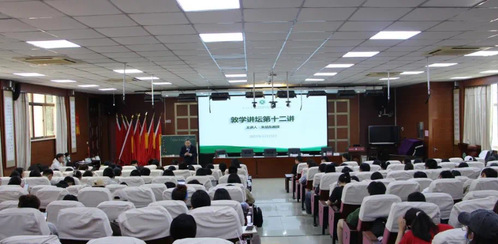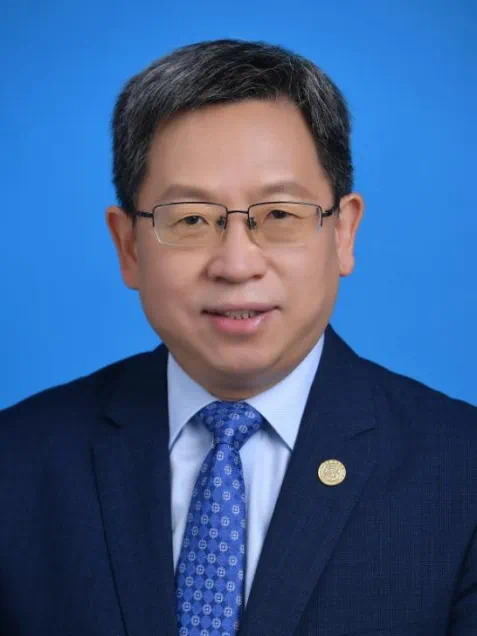On May 23rd, Professor Zhu Xudong, a specially appointed professor of "Yangtze River Scholars" from the Ministry of Education and Minister of Education at Beijing Normal University, was invited to give a wonderful lecture titled "How to interpret the report of the 20th National Congress of the Communist Party of China on 'Developing Quality Education'. This lecture was hosted by Professor Huang Xiao, Dean of the School of Education (Faculty of Teacher Education), and attended by over 150 teachers and students.

At the beginning of the lecture, Zhu Xudong raised two questions to stimulate the audience's thinking: why did the report of the 20th National Congress not mention "core competencies" but instead mention "quality education"? What new interpretation will there be when we understand 'quality education' again today? The audience spoke enthusiastically to express their views and opinions, and then Zhu Xudong introduced the focus of this lecture - "quality education" in the new era.
Zhu Xudong advocates that "quality education" in the new era should cover ideological and political literacy, innovation ability, global citizenship literacy and global leadership literacy, health literacy, and digital literacy. He believes that from the perspective of China's development, the top priority in "quality education" is ideological and political literacy, which mainly refers to having political awareness, sensitivity, and sensitivity. The second is innovation awareness or innovation ability. Innovation ability is a quality that every scientific researcher must possess. Conducting academic research requires constantly surpassing existing academic ideas and viewpoints, and the proposal of new ideas, viewpoints, concepts, and concepts. Specifically, in classroom teaching, the development of quality literacy requires practical abilities across fields, organizations, departments, and disciplines, namely interdisciplinary literacy.
Zhu Xudong pointed out that having interdisciplinary literacy is to solve problems, that is, problem solving; Developing the ability to discover problems is also an important part of 'quality education'. The third is global citizenship literacy and global leadership literacy, that is, humanistic literacy, which refers to "self" and the ability to independently choose one's own development path. In the process of development, it is also necessary to be closely linked to the development of the country, and from the perspective of quality, it is necessary to possess scientific and technological qualities; In the development of science and technology education, there are two most important thinking modes, namely computational thinking and engineering thinking. The fourth is health literacy or health literacy, advocating the construction of a health education system, which includes five aspects: physiological and health science education, nutrition science education, sports science education, positive psychological literacy, and common disease prevention science education. The fifth is digital literacy, which he regards as a survival skill in the digital age, and is an important skill related to the basic living ability of the whole people, with integrated and interdisciplinary characteristics.
Only by understanding the content of quality education in the new era and then looking at the development of "quality education" can it have directionality. So how should we develop quality education? Zhu Xudong proposed corresponding suggestions: firstly, it is necessary to implement the Party's educational policy and bear in mind the fundamental task of cultivating morality and talent; Secondly, adhere to the comprehensive development of moral, intellectual, physical, aesthetic, and labor education; Finally, it is necessary to combine educational production labor with social practice.
Zhu Xudong shares his views and opinions on the development of quality education with a humorous and witty explanation style. The report has a lofty position, distinct themes, and rich content, both theoretical and practical depth, deepening everyone's understanding of the new era of "quality education" and benefiting everyone greatly.

Zhu Xudong, Ph.D., Professor, Doctoral Supervisor, Changjiang Scholar Distinguished Professor of the Ministry of Education, Minister of Education Department of Beijing Normal University, Director of Teacher Education Research Center of Beijing Normal University, Member and Secretary General of the National Teacher Education Advisory Expert Committee of the Ministry of Education, and Member of the Teacher Professional Certification Expert Committee of the Ministry of Education Vice Chairman and Secretary General of the Teacher Education Branch of the Chinese Association of Higher Education, as well as a specially invited researcher from the Central Committee for the Democratic Progressive Movement.
I have been engaged in research in the fields of teacher education discipline construction, institutional policies, comparative education, and foreign education history for a long time. I have published over 200 academic papers, authored, edited, and translated 27 books, edited 47 books in 2 sets, and compiled 13 books in 2 sets. Candidate for the Beijing New Century Social Science Hundred Talents Project. The first batch of talents from the "four batches" of Beijing's propaganda and cultural system. Received the first prize for national teaching achievements in higher education and the special prize for teaching achievements in higher education in Beijing. In 2010, he/she was an excellent doctoral thesis advisor in Beijing, a candidate for the 2010 New Century Excellent Talent Support Program of the Ministry of Education, one of the first experts in the "National Training Program" of the Ministry of Education, a supervisor for the 2011 National Hundred Doctoral Dissertations Nomination Award, and a senior visiting scholar at the University of Maryland under the Fulbright Program Fund.